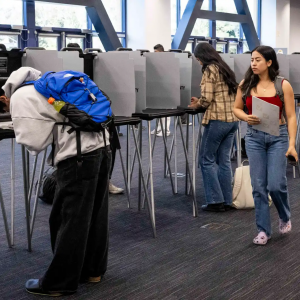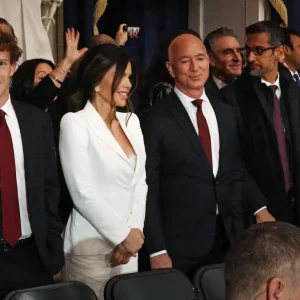Sitting high on Capitol Hill, the distant and seemingly elitist Congress has struggled to maintain Americans’ trust, with reports showing a measly 26% of the public trusts our legislative branch. Americans feel separated from Congress, and it’s a trend that has persisted over the last 20 years as politics become increasingly polarized among parties. Members of Congress appear unable to satiate the public and cite burnout, struggles with polarization, and slow-moving politics that make their job difficult. Despite this, representatives remain in office and hold their power—and it makes sense. With a career in Congress, members can build their assets, maintain political influence, and gain access to the tables with the most powerful people. When the perks of being in office continue to stack to an impossible level, then members of Congress have every reason not to leave. If some representatives stay in office for the benefits the majority of Americans can’t have, how can we trust them and what is there to do?
In an interview with Dr. Eric Schickler, who wrote Disjointed Pluralism and has researched Congress his entire career states that the question isn’t just how members stay in office, but why they manage to stay. “For many people, it’s [Congress] an attractive career,” he states. “It’s a reasonably well-paying job, [it] gives you the chance to exert influence, and if you care about policy or power—it’s a good avenue for that.”
But it wasn’t always designed to be this way. As a political scientist, Schickler is an expert specializing in Congress and partisanship. Congress differs from other federal branches in two ways—its members are not elected, nor do they have term limits. Schichler argues that this is by design, He references James Madison, one of the framers to whom we contributed the structure of American politics stating that “Madison did think that the desire to be reelected was a good thing because it would motivate members to serve their constituents to be accountable.” According to Schichler, our legislative branch has continued to change over the years.
Despite this, there is a rising consensus among Americans that members of Congress are doing a bad job and failing to listen to the concerns of people in their district. Even when accounting for party affiliation, Americans generally share the same distrust and frustration with Congress. In a Pew Research study, individuals state that elected officials aren’t focused on the right issues, have bad character traits, and are too partisan to be effective. In a way, the incumbency problem can explain some of these shortcomings. Staying in office can disconnect representatives from their constituents by having a mindset that prioritizes what’s best for staying on the hill—not what’s always best for home.
Schickler says that times have changed, especially regarding limitations on incumbency and reelection. “I think what’s different is [Madison] wouldn’t have expected members to have these additional advantages due to the resources of [the] office.” Unlimited travel budget, pensions, and worker’s compensation are just the first layer of perks. Even parking is an added benefit, where members can park in illegal zones if necessary. “They have personal staff, a big travel budget, and so on,’’ Schickler states, confirming the benefits to public office.
When asked about these seemingly endless reasons to stay in office, Schickler finds that nowadays, there are “additional advantages due to the resources of office that quite possibly allowed them to stay [in office] for a long time.”
“I think Madison’s ideal would have been members come in – maybe they get reelected once or twice, and then move on,” Schickler reasons. Many agree that reelection is a central component of Congress. He argues that members have a constant “motive to stay in,” and this is supported by incumbency. Reelection is a way to market yourself as an effective leader, it helps that winning another election means that you maintain power and influence.
To Schickler, other important factors motivate members to stay in office. Many members of Congress stay in public office, where the “primary or first goal for every member is reelection.” Schickler believes that “sometimes it’s more their party that they care about,” but that doesn’t necessarily mean it’s the case for every member.
On top of having immense support from your party and individual constituents, there are also real financial benefits to being in Congress. Schickler highlights that campaign finance and positionality make it easier for incumbents to raise money in comparison to their opponents. According to CNBC, nearly 95% of members running for reelection are voted back into office. Incumbents can build lifelong careers, spanning across generations of Americans and supported by access to funding and advantages from within Congress. As of 2018, incumbents raised over 260 million dollars, in comparison to challengers who held less than 23 million.
Over the years, we’ve seen a drastic increase in the amount of money political candidates raise for their campaigns. As the Senate race for California reaches a level of fundraising that is unheard of, it should be the right of Americans to question how politics can be for the people while remaining so inaccessible. On average, Americans earn barely half of what members of Congress are guaranteed from sitting in office alone. With a salary for lawmakers ranging around double that of Americans as stated by CBS, it seems unlikely that the gap between us and our representatives will ever be mended.
Political leaders are supposed to be cut from the same cloth—a representative who protects their constituents’ interests and advocates for their concerns. Staying in office grants access to unlimited avenues that exploit the system. Politicians and lawmakers can avoid the law and become demigods of their profession, regardless of their merits or questionable pasts. Matt Gaetz, a household name in the GOP, avoided charges of sex trafficking and obstruction of justice without any repercussions. Missouri Senator John Hawley’s agency broke the law by helping finance his campaign for Senate, adding to the long list of individuals who take advantage of networks and financial avenues through Congress. There are too many ways that members of Congress can use their power to their advantage. With tax breaks, worker’s compensation, free travel, stock trade options—even a beauty salon dedicated to lawmakers means that members get to live it up.
Members of Congress use their party to their advantage, wherein they can find support through endorsements, fundraising, and lobbying. And the members who benefit the most are usually those with the most financial support.
How do you raise money early in your campaign? Shickler argues that it helps if you’ve been in office, especially when you can build on that network. “Certainly within Congress itself, you have access as an incumbent to lots of people who want your attention, and are often going to be willing to give you money,” Schickler argues. “And that early money helps launch candidates. I think within Congress, we certainly see that members who are good fundraisers and raise a lot of money for their parties have advantages in getting, promoted to committee chairmanships and chairships, I should say, and other kind of leadership roles,” Schickler said about how campaign finance attributes to effectiveness in Congress.
And some members of Congress hold on, serving years in office and becoming leaders within their parties. Primary examples of these life-long careers include the late California Senator Dianne Feinstein, who served in public office for over 30 years. Alabama Senator Richard Shelby, a Republican powerhouse who was known for his leadership in Congress, served 44 years in public office. While they aren’t necessarily the norm, Feinstein and Shelby’s careers in Congress demonstrate how out-of-touch and inaccessible the career has become.
The path to Congress isn’t linear, but there are overlapping themes of careers and skills that give some people an advantage over others. More than 70% of the House had experience working as private lawyers, while some had backgrounds as medical professionals, both of which are coupled with salaries most Americans would never earn. Additionally, only 5% of House members don’t hold a bachelor’s degree, while two-thirds of the American public is made up of individuals without a college degree. Part of the reason individuals with a law background do so well is because of connections. Schickler states that lawyers, especially those coming from elite law schools, are one of many privileged backgrounds lawmakers can come from. Individuals with money and connections at these schools build careers that have the salaries to support running for Congress. Those who graduated from these law schools have access to an extensive network of donors and experienced professionals who can support and guide politicians running for Congress. On top of this, Schickler argues that their academic background can play a vital role in the way they network and raise money for campaigns.
Education plays an important role in the way Americans can access not only Congress but politics in general. When politicians come from these elite backgrounds with experiences that do not represent us, it makes sense that we don’t trust them. Representatives are supposed to embody the people, but nowadays they represent themselves—even if not by design. Although not necessarily elitist by nature, Congress has gradually become so in the way that they’ve implemented benefits over time. As a possible consequence of the new nature of Congress, Americans are more trustful of local politics and not our legislative branch. Incentivizing Americans to become invested in politics and build trust in our institutions involves working from the ground up, something that Schickler recognizes as crucial to representative democracy.
When asked how this defines representatives’ relationship with constituents, Schickler acknowledges the work that’s been done by lawmakers. Schickler argues that more members are entering Congress with a sincere ideological agenda. Representatives such as Justin Jones, a Democratic House member, led protests to end gun violence alongside his constituents. He was one of the members outed from his position as a result, sparking criticism throughout the nation. Alexandria Ocastia-Cortez embodies a similar commitment to politics, and her background mirrors that of her constituents. As an activist and member of the working class, Cortez delivered one of the biggest democratic overthrows in history. Members such as Cortez or Jones are outliers in their field, but they represent a change in the status quo of politics.
New members facilitate a new dialogue and perspective in an age-old institution that has struggled to adapt to change. While some politicians enjoy first-class benefits with a guaranteed path of success, members such as Maxwell Frost can’t even afford the rent in DC. Coming into politics with backgrounds and experiences that are more representative of Americans can cultivate incentive and motivation for individuals to vote and participate both locally and nationally. Through this, Americans can become engaged in politics and create systemic change using their voices and votes. Schickler agrees with this sentiment, believing that individuals can get involved in politics by working on the Hill, with grassroots organizations, and in local elections. You can build connections with your representatives and local organizations to address the issues in your community and enact realistic change. The Congress we see today is polarized, with the institution split by desperately holding onto tradition and needing profound change to represent the current generation of Americans.
Getting into politics doesn’t mean you have to graduate from Harvard, Schickler argues that there are different paths individuals can take to being involved in politics. To him, working in the Capitol allows people to understand and experience the functioning of a lawmaker’s job. From there, you can work alongside politicians and advocacy groups, building connections that Schickler states will transfer into work back home in your community. Working with non-profit and volunteer organizations creates connections and incentives to be involved in politics, much like how Cortez reached her office through advocacy work. Even with current pessimism directed toward Congress, we can and should continue to exercise our right to political participation.
Whether it’s on Capitol Hill, in a local soup kitchen, at your job, or in the classroom, we are constantly engaging in a political dialogue and critique, even if it’s hidden between the lines. Congress is the embodiment of the American people and yet the institution has not properly adapted to the new generations. When the institutions that represent us no longer seem trustworthy or reliable, Americans have every right to voice their concerns. Despite Americans’ cynical feelings about Congress, we should remind ourselves that systemic change is rooted in individual mindsets.
Featured Image Source: NBC News






Comments are closed.